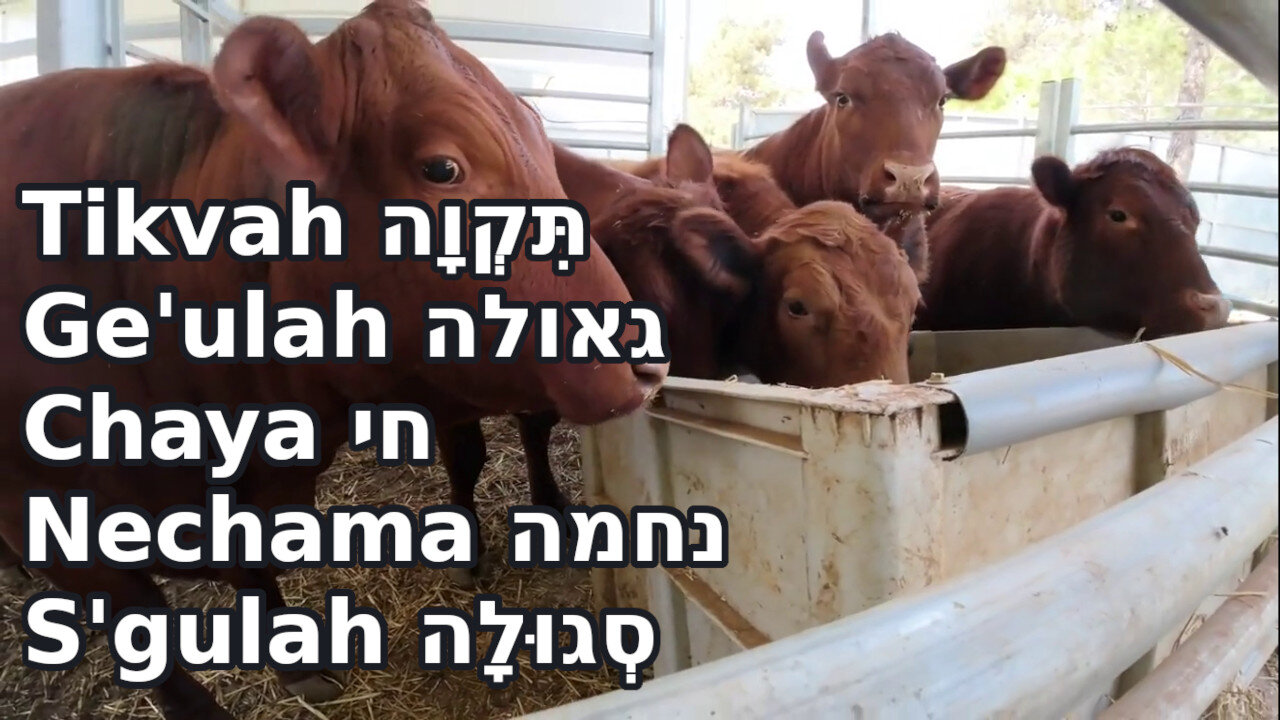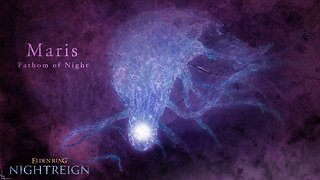Premium Only Content

Let's Learn Some Hebrew Together! (Livestream 26 April 2024)
The names of the five Red Heifers at Shilo:
#Tikvah תִּקְוָה - Hope
https://en.wikipedia.org/wiki/Hatikvah
Hatikvah (Hebrew: הַתִּקְוָה, romanized: hattīqvā, [hatikˈva]; lit. 'The Hope') is the national anthem of the State of Israel. Part of 19th-century Jewish poetry, the theme of the Romantic composition reflects the 2,000-year-old desire of the Jewish people to return to the Land of Israel in order to reclaim it as a free and sovereign nation-state.
#Geulah גאולה - Redemption
also applies to individuals or groups: an Israelite slave, an Israelite captive, and the firstborn son pidyon haben, (Hebrew: פדיון הבן) or redemption of the first-born son, is a mitzvah in Judaism whereby a Jewish firstborn son is redeemed from God by use of silver coins to a kohen. It is from these three cases that the concept of exilic redemption is derived because the People Israel are considered God's 'firstborn' derived from Jacob, who are God's slaves forever, but are currently held captive, even while they reside in the modern state of Israel.
In Rabbinic Judaism, redemption refers to God redeeming the Israelites from their exiles, starting with that from Egypt. This includes the final redemption from the present exile.
#Chaya יח - Coming back to life
https://en.wikipedia.org/wiki/Chai_(symbol)
Two common Jewish names used since Talmudic times, are based on this symbol, Chaya feminine, Chayim masculine.[citation needed] The Jewish toast (on alcoholic beverages such as wine) is l'chaim, 'to life'.
The word is made up of two letters of the Hebrew alphabet – Chet (ח) and Yod (י), forming the word "chai", meaning "alive", or "living". The most common spelling in Latin script is "Chai", but the word is occasionally also spelled "Hai". The usual modern pronunciation of this word is [χai̯], while a transcription of the Biblical and Mishnaic pronunciation would have likely been [ħai̯] (with a pharyngeal consonant).
In Hebrew, the related word chaya (חיה) means "living thing" or "animal", and is derived from the Hebrew word chai (חי), meaning "alive".
the Talmud states that the world was created from Hebrew letters which form verses of the Torah. In medieval Kabbalah, Chai is the lowest (closest to the physical plane) emanation of God. According to 16th century Greek rabbi Shlomo Hacohen Soloniki, in his commentary on the Zohar, Chai as a symbol has its linkage in the Kabbalah texts to God's attribute of 'Ratzon', or motivation, will, muse
#Nechama נחמה - A Hebrew girls name that means "consolation" or "to console or to comfort"
https://en.wikipedia.org/wiki/Habanot_Nechama
Habanot Nechama (Hebrew: הַבָּנוֹת נֶחָמָה, "The Comfort Girls" or "The Daughters of Consolation") is an Israeli folk band.[1] The group is composed of three female vocalists: Karolina, Dana Adini, and Yael Deckelbaum.
They are best known for their self-titled, debut album which went platinum (over 40,000 records sold) in Israel, and their hit song So Far.
#Sgula סְגוּלָה Like a "Treasure"
https://en.wikipedia.org/wiki/Sgula
Sgula (Hebrew: סְגֻלָּה, סגולה) is a moshav in south-central Israel. North of Kiryat Gat, it falls under the jurisdiction of Yoav Regional Council. In 2022 it had a population of 717.
The moshav was founded in 1953 by native Israelis on land that had belonged to the Palestinian village of Summeil, which was depopulated in the 1948 Arab–Israeli War. The name may be based on a verse in Exodus (19:5) where the word segula is used in the sense of "special treasure" or jewel: "Now if you obey me fully and keep my covenant, then out of all nations you will be my special treasure (sgula).
#Segula (Kabbalah)
https://en.wikipedia.org/wiki/Segula_(Kabbalah)
A segula (Hebrew: סגולה, pl. סגולות, segulot, "remedy" or "protection") is protective or benevolent charm or ritual in Kabbalistic and Talmudic tradition.
Etymology
In medieval magic, the term sigil (/ˈsɪdʒɪl/) was commonly used to refer to occult signs which represented various angels and demons which the practitioner might summon. In this context the term sigil derives from the Latin sigillum, meaning "seal." Maimonides (1:4) strongly urges against writing sigils on the back of a mezuzah, turning the mezuzah into an amulet
The word segula appears in the Hebrew Bible in Exodus 19:5 and Deuteronomy 7:6, where God refers to the Jewish nation as his segula (treasure). The root of this word, segol, is the name of a Hebrew vowel-point represented by three dots. According to the Ohr Hachaim, a segula is "a charm that supersedes logic".
-
 56:41
56:41
Donald Trump Jr.
8 hours agoLies, Leaks, and Lawfare: Censorship Corruption Exposed | TRIGGERED Ep.263
140K120 -
 1:19:46
1:19:46
Precision Rifle Network
5 hours agoS4E25 Guns & Grub - Rex Is Back, I shot the 6.5PRC finally...
11.6K1 -
 LIVE
LIVE
rhywyn
2 hours agoうつ
24 watching -
 LIVE
LIVE
RyuMuramasa✧
4 hours agoNEW Everdark Sovereign | Elden Ring Nightreign | LIVE Playthrough
33 watching -
 1:17:04
1:17:04
Nikko Ortiz
12 hours agoLive - News, Politics, Podcast And Naaah Im Playin We Chillen
5.58K -
 1:26:13
1:26:13
Mally_Mouse
6 hours agoLet's Hang!! -- P.O. Box & Chill!
18.7K -
 1:02:37
1:02:37
BonginoReport
7 hours agoKamala Teases Book About Dumpster Fire Campaign - Nightly Scroll w/ Hayley Caronia (Ep.102)
72.6K58 -
 35:05
35:05
Stephen Gardner
7 hours ago🔥Obama will be FORCED to Testify in Trump trial?
33.6K54 -
 9:08
9:08
Tundra Tactical
4 hours ago $0.04 earnedTundra Tactical Political Memes Review!
24.2K2 -
 DVR
DVR
GloryJean
5 hours agoDuos w/ Spartakus 🔥 LOCK IN for Games w/ PASSION
11.7K